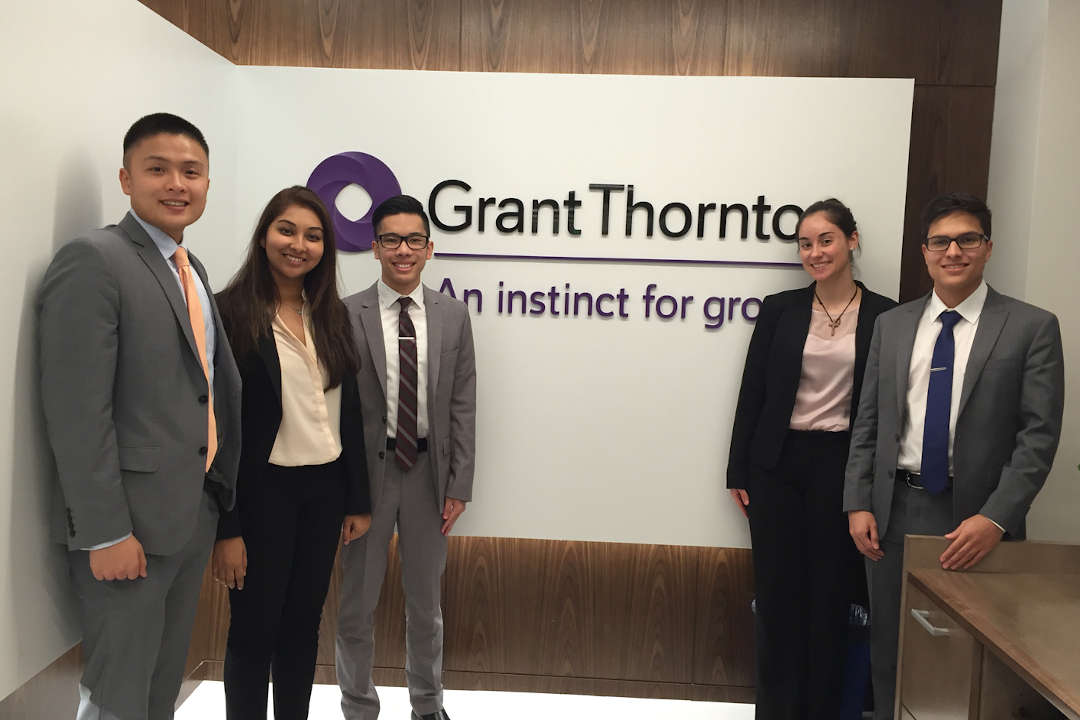
A team of five Jindal School of Management accounting students are “saddling” up for a new case competition sponsored by the Dallas office of Grant Thornton, one of the nation’s leading accounting firms. The team — comprising graduate student Tue Tran, senior Anisa Din, junior Andrea Alvarez, and sophomores Jordan Anwer and Kevin Nguyen — has developed a complex business solution related to problems involving the fictitious company Saddles Inc.
Calling itself ACES Consulting, the group will make a 30-minute presentation, followed by a 15-minute question-and-answer session, to five senior accounting executives, hoping to “win” their business. The competition, scheduled at Grant Thornton’s offices on Nov. 6, pits teams from UT Dallas, the University of North Texas, The University of Texas at Arlington and Texas Christian University against each other. The winning team will receive $7,500; the second-place team $2,500. Additionally, the winning university will host the Grant Thornton Metroplex Case Competition next year.
“This has been an eye-opening project for us,” says team captain Tran. “It’s like having a third part-time job — aside school and our ‘real’ work. And it carries the pressure of a high-level competition. Before the competition, we knew each other from classes and school activities, but now we’ve bonded much more as teammates and friends.”
The new case competition is a result of the efforts of BS in Accounting Program Director John Barden and JSOM 1991 alumnus Pat McCown, a partner and practice leader at Grant Thornton and JSOM Advisory Council member.
“This offers an amazing opportunity for these students,” says Barden, clinical professor and team coach. “They are judged by high-level executives in the field, giving them practical knowledge from real-world professionals, that they can combine with what they are learning in the classroom.”
Grant Thornton presented the idea for the case competition at a meeting of 32 interested students. Interviews with Barden whittled that number down to five, the required number for each team. Barden said he looked for communication skills, presentation skills and the ability to serve as a team player, when selecting students.
Teams were given the case study Oct. 15, providing them three weeks to prepare their presentations. However, they were to be sent an unexpected “twist” in the case scenario the evening before the competition — compelling them to adapt their responses to meet new challenges, “as in the real business world,” Barden says.
“Our hard work on this case study competition has been extraneous on our academic schedules but will undoubtedly result in the most beneficial gain of accounting knowledge,” says team member Alvarez. “Our team could not be more proud to represent UTD in the real business world!”
For Grant Thornton, the new case competition offers a way to network with the best and brightest of students, who later might be prospective interns and/or employees, Grant Thornton’s McCown says.
“The public accounting world is highly competitive today in terms of recruiting and hiring students,” McCown says. “This competition gives us a chance to heighten brand awareness of our firm on these campuses, which are important recruiting grounds for us.
“It also gives students the opportunity to demonstrate skill sets that don’t always show in the college classroom. Presenting in front of outsiders instead of in class takes the game to another level.”

